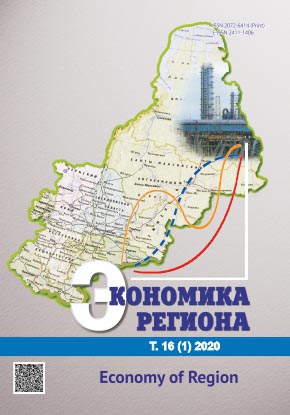THE ROLE OF MONETARY POLICY IN COMPARATIVE ADVANTAGE AND TRADE BALANCE OF CAPITAL-INTENSIVE INDUSTRY IN INDONESIA
THE ROLE OF MONETARY POLICY IN COMPARATIVE ADVANTAGE AND TRADE BALANCE OF CAPITAL-INTENSIVE INDUSTRY IN INDONESIA
Author(s): Chandra UTAMA, Ruth MeiliannaSubject(s): Economy
Published by: Институт экономики Уральского отделения Российской академии наук
Keywords: capital-intensive industry; monetary policy; interest rates; inflation targeting; international trade; export; comparative advantage; trade balance; Indonesia; difference in differences
Summary/Abstract: This paper examines the influence of monetary policy on comparative advantage and trade balance of capital-intensive industries (technology-intensive industry and human capital-intensive industry). Ever since Indonesia implemented the Inflation Targeting Framework (ITF) in 2005, the average interest rates have been gradually declining, making capital more affordable. The Heckscher-Ohlin-Samuelson (HOS) model states that lower interest rates will improve comparative advantage and trade balance of capital-intensive industry. In our research we used annual export and import data for the period from 2000 to 2017, drawing on the threedigit Standard International Trade Classification (SITC) revision 2 from United Nations Commodity Trade Statistics Database (UN-COMTRADE). The study combines Revealed Symmetric Comparative Advantage (RSCA) and Trade Balance Index (TBI), used for analysing Product Mapping. Additionally, we applied the Difference in Differences (DD) model to measure the real impact of the ITF on capital-intensive industries choosing unskilled labour-intensive products as a control group. For analysing the effect of the ITF on probability of positive changes of comparative advantage and trade balance we used the Logit model. Based on product mappings, we cannot conclude that the situation for capital-intensive products is better in 2014 than in 2000, pre-ITF. However, the DD and the Logit model show that the ITF positively influences comparative advantage and trade balance of capital-intensive products and significantly impacts trade balance of unskilled labour-intensive products. The study concludes that the ITF have positive impact on comparative advantage and trade balance of capital-intensive industry in Indonesia.
Journal: Экономика региона
- Issue Year: 16/2020
- Issue No: 1
- Page Range: 298-309
- Page Count: 12
- Language: English

